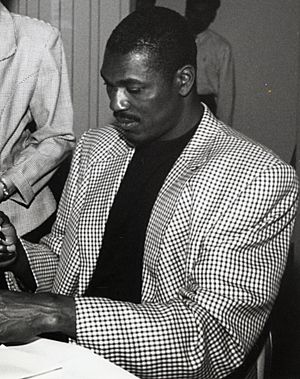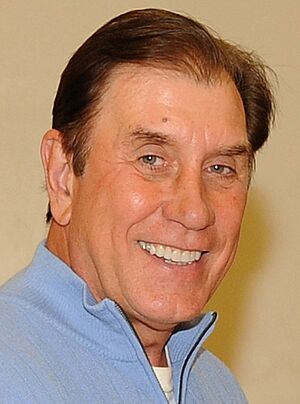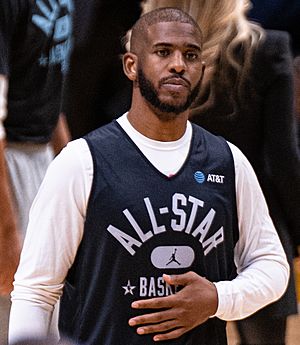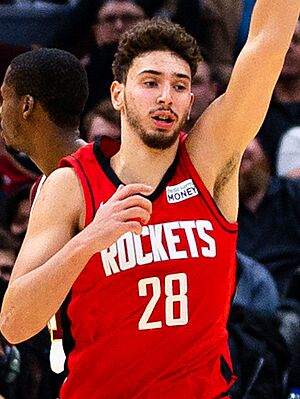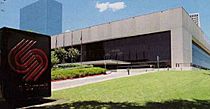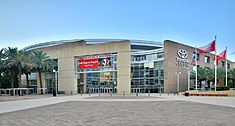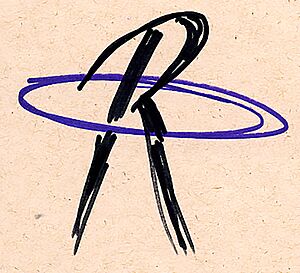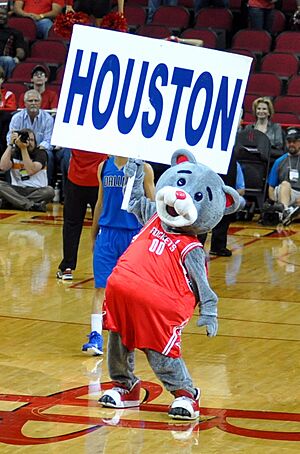Houston Rockets facts for kids
Quick facts for kids Houston Rockets |
|||||
|---|---|---|---|---|---|
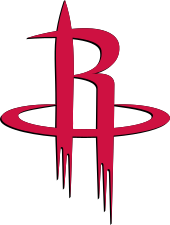 |
|||||
| Conference | Western | ||||
| Division | Southwest | ||||
| Founded | 1967 | ||||
| History | San Diego Rockets 1967–1971 Houston Rockets 1971–present |
||||
| Arena | Toyota Center | ||||
| Location | Houston, Texas | ||||
| Team colors | Red, black, gray, anthracite, white |
||||
| Main sponsor | Credit Karma | ||||
| President | Gretchen Sheirr | ||||
| General manager | Rafael Stone | ||||
| Head coach | Ime Udoka | ||||
| Ownership | Tilman Fertitta | ||||
| Affiliation(s) | Rio Grande Valley Vipers | ||||
| Championships | 2 (1994, 1995) | ||||
| Conference titles | 4 (1981, 1986, 1994, 1995) | ||||
| Division titles | 9 (1977, 1986, 1993, 1994, 2015, 2018, 2019, 2020, 2025) | ||||
| Retired numbers | 7 (11, 22, 23, 24, 34, 44, 45) | ||||
|
|||||
The Houston Rockets are a professional basketball team from Houston, Texas. They play in the National Basketball Association (NBA) as part of the Southwest Division in the Western Conference. Their home games are played at the Toyota Center in Downtown Houston. The Rockets have won two NBA championships and four Western Conference titles. The team started in 1967 as the San Diego Rockets in San Diego, then moved to Houston in 1971.
In their first season in 1967, the Rockets won only 15 games. They picked Elvin Hayes first in the 1968 NBA draft, and he helped them reach the playoffs in his first year. The Rockets didn't have a winning season for almost ten years. In the 1976–77 season, they got Moses Malone, an All-Star center from the ABA. Malone led Houston to the Eastern Conference Finals in his first year. In the 1980–81 season, the Rockets made the playoffs even with a losing record (40–42). Led by Malone, they reached their first NBA Finals in 1981, but lost to the Boston Celtics.
In the 1984 NBA draft, the Rockets again had the first pick and chose Hakeem Olajuwon. He became the most important player during the team's best years. Olajuwon and Ralph Sampson, who was 7-foot-4-inch (2.24 m) tall, were called the "Twin Towers." They led the team to the 1986 NBA Finals, where they lost to the Boston Celtics again. The Rockets kept making the playoffs in the 1980s but struggled to get past the first round after 1987. Rudy Tomjanovich became head coach in the 1991–92 season. With Olajuwon leading the way, the Rockets had a great 1993–94 season, winning a record 58 games. They went to the 1994 NBA Finals and won their first championship against the New York Knicks. The next season, with Clyde Drexler joining the team, the Rockets won their second championship by sweeping the Orlando Magic in four games.
The Rockets added Charles Barkley in 1996 but couldn't get past the Western Conference Finals. By 2001, Olajuwon, Drexler, and Barkley had all left. In the early 2000s, with stars Tracy McGrady and Yao Ming, the Rockets played well in the regular season but often struggled in the playoffs due to injuries. After Yao retired early in 2011, the Rockets started rebuilding their team.
The team got James Harden in 2012, which brought the Rockets back into the championship picture for the rest of the 2010s. They had winning seasons for all nine years Harden was on the team. Harden led the team to two Western Conference Finals (losing both times to the Golden State Warriors). Before the 2020–21 season, coach Mike D'Antoni and general manager Daryl Morey left. Harden then asked for a trade and was sent to the Brooklyn Nets, starting another rebuilding phase for the team.
Moses Malone, Hakeem Olajuwon, and James Harden have all won the NBA's MVP award while playing for the Rockets. The Rockets, especially under general manager Daryl Morey, were known for using advanced statistics to pick players and decide how to play, similar to how sabermetrics is used in baseball.
Contents
- Team History
- Season-by-Season Records
- Home Arenas
- Team Identity
- Honors and Statistics
- Team Personnel
- Team Management
- Head Coaches
- Team and Politics
- See also
Team History
Early Years: San Diego Rockets (1967–1971)
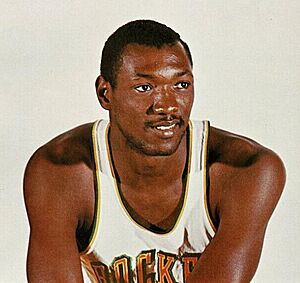
The Rockets started in 1967 in San Diego. The owner, Robert Breitbard, paid $1.75 million to join the NBA as a new team for the 1967–68 season. The NBA wanted more teams in the Western United States. San Diego was chosen because it was growing fast and had a successful local ice hockey team. The team was named "Rockets" to honor San Diego's theme of "a city in motion" and the local company that made Atlas missiles.
The Rockets' first coach and general manager was Jack McMahon. The team was built with experienced players from an expansion draft and college players from the 1967 NBA draft. Their first draft pick was Pat Riley. The Rockets lost their first two games but won their third game against the Seattle SuperSonics. In their first season, the Rockets lost 67 games, which was an NBA record at the time.
In 1968, the Rockets won a coin toss and got the first pick in the 1968 NBA draft. They chose Elvin Hayes from the University of Houston. Hayes helped the Rockets improve their record to 37 wins and 45 losses, making the playoffs for the first time in 1969. However, they lost to the Atlanta Hawks. The Rockets had a tough 1969–70 season, finishing 27–55, and barely missed the playoffs in the 1970–71 season.
Off the court, the owner, Robert Breitbard, faced big financial problems with his arena. He also had to pay the NBA expansion fee. Many professional sports teams were losing money at this time. Fans tried to help keep the Rockets in San Diego, but it was too difficult. On January 12, 1971, San Diego hosted the 1971 NBA All-Star Game. On June 23, 1971, the San Diego Rockets were sold to a group from Houston. The NBA quickly approved the sale because the team was close to shutting down.
Moving to Houston and Early Growth (1971–1976)
Texas Sports Investments bought the team for $5.6 million and moved it to Houston before the 1971–72 season. The team became the first NBA team in Texas. The name "Rockets" fit Houston well because of its strong connection to the space industry.
The Rockets didn't have their own arena at first in Houston. They played in different places like the Astrodome and Sam Houston Coliseum. They also played "home" games in other cities to try and get more fans. In their first season in Houston, they averaged less than 5,000 fans per game.
In 1972–73, the Rockets introduced their famous "ketchup and mustard" logo, which had a gold basketball with red trails. They also changed their uniforms. Coach Tex Winter left, and Johnny Egan took over. Egan led the Rockets back to the playoffs in 1975. They won their first playoff series against the New York Knicks but then lost to the Boston Celtics. The Rockets became more popular in Houston during this time, selling out many home games.
The Moses Malone Era (1976–1982)
In the 1975–76 season, the Rockets moved into their first permanent home in Houston, The Summit. They played there for the next 29 years. After missing the 1976 playoffs, Tom Nissalke became coach. He helped the team get John Lucas and Moses Malone. These new players made a big difference. The 1976–77 Rockets won their division and reached the Eastern Conference Finals, losing to the Julius Erving-led Philadelphia 76ers.
The next season was tough because captain Rudy Tomjanovich was injured. After trading Lucas, the Rockets returned to the playoffs in 1978–79. Moses Malone won the MVP Award in 1979, but the team lost in the first round. Nissalke was replaced by Del Harris.
In 1979, George Maloof bought the Rockets. After he passed away, his son Gavin took over. In 1982, Charlie Thomas and Sidney Shlenker bought the team. The Maloof family later owned the Sacramento Kings. The Maloof years were important for the Rockets, as they reached their first Western Conference Championship and NBA Finals in 1981. Before the 1980–81 season, the Rockets moved back to the Western Conference. They made the playoffs with a 40–42 record, which was a losing record. They beat the Lakers, Spurs, and Kings to reach the Finals. In the NBA Finals, they faced Larry Bird's Boston Celtics and lost in six games.
The Rockets traded Moses Malone to the Philadelphia 76ers because they couldn't afford his salary. The team then had a very bad season, winning only 14 games. They hired coach Bill Fitch and got the first pick in the 1983 NBA draft, choosing Ralph Sampson. Sampson played well, but the Rockets were still the worst team. They got the top pick again in the 1984 NBA draft and selected Hakeem Olajuwon.
The Hakeem Olajuwon Era (1984–2001)
The "Twin Towers" (1984–1987)
In his first season, Olajuwon helped the Rockets win 19 more games. They made the playoffs but lost to the Utah Jazz. Olajuwon and Sampson were called the "Twin Towers" because they were both very tall and played well together. In the next season, Houston won their division with 51 wins. In the playoffs, they swept the Kings, beat the Nuggets, and then surprised everyone by beating the defending champion Lakers. This led them to their second Finals appearance in the NBA Finals, where they again played the Celtics. The Celtics won the series in six games.
After the Finals, the Celtics coach said the Rockets were "the new monsters on the block." However, the team struggled the next season with player issues. They lost in the second round of the playoffs to the Seattle SuperSonics. Early in the 1987–88 season, Sampson was traded, ending the "Twin Towers" era. Sampson's career was cut short by knee injuries.
Building a Championship Team (1987–1992)
For the next five seasons, the Rockets either missed the playoffs or lost in the first round. Coach Fitch was fired and replaced by Don Chaney. Chaney had his best season in 1990–91, winning Coach of the Year, even though Olajuwon missed 25 games. The team brought in players like Kenny Smith, Vernon Maxwell, Robert Horry, Mario Elie, Sam Cassell, and Otis Thorpe, who would become important later.
Midway through the 1991–92 season, Rudy Tomjanovich, a former Rockets player, became head coach. The Rockets didn't make the playoffs that year, but things started to look up. The next year, they won their division and their first playoff series in six years, beating the Los Angeles Clippers. They then lost a close Game 7 in overtime to the SuperSonics.
Back-to-Back Championships: "Clutch City" (1993–1995)
On July 30, 1993, Leslie Alexander bought the Rockets. In Tomjanovich's second full season, the 1993–94 season, the Rockets started by winning their first 15 games, tying an NBA record. Olajuwon was named MVP and Defensive Player of the Year, and the Rockets won a franchise-record 58 games. After beating the Portland Trail Blazers, they faced the Phoenix Suns, led by Charles Barkley. The Rockets lost the first two games at home, leading local newspapers to call Houston "Choke City." But the Rockets came back to win the series in seven games, earning the nickname "Clutch City." This name became a famous part of Houston's history. The Rockets then beat the Utah Jazz to reach their third NBA Finals. They faced the New York Knicks and won their first championship in franchise history in seven games. Olajuwon was named Finals MVP.
The Rockets struggled at the start of the 1994–95 season. They traded for Clyde Drexler, Olajuwon's former college teammate. With only 47 wins, the Rockets were the sixth seed in the Western Conference playoffs. But they had a strong playoff run, beating the top three teams in the West (Jazz, Suns, and Spurs) to reach the Finals again. This time, they played the Orlando Magic, led by Shaquille O'Neal. Houston swept the Finals in four games, becoming the first team to win the championship as a sixth seed. Olajuwon was again the Finals MVP. After winning their second title, Coach Rudy Tomjanovich famously said, "Don't ever underestimate the heart of a champion!"
After the Championships and Rebuilding (1995–2002)
After their second championship, the Rockets changed their team colors to navy blue and silver and got a new logo. In the 1995–96 season, Olajuwon became the NBA's all-time leader in blocked shots. The Rockets lost to the SuperSonics in the playoffs.
Before the next season, the Rockets traded for Charles Barkley. The "Big Three" of Olajuwon, Drexler, and Barkley had a good season, winning 57 games, but lost to the Utah Jazz in the Western Conference Finals. The next season was affected by injuries, and they lost to the Jazz again in the playoffs.
Drexler retired, and the Rockets traded for Scottie Pippen. In the 1998–99 season, which was shorter due to a lockout, the Rockets lost to the Lakers in the first round. After trading Pippen and Barkley getting a career-ending injury, the Rockets missed the playoffs in 1999–2000. Steve Francis was named Co-Rookie of the Year.
In the 2000–01 season, the Rockets won 45 games but still missed the playoffs in a very competitive Western Conference. In the off-season, 38-year-old Olajuwon asked for a trade and was sent to the Toronto Raptors. The 2001–02 season, the first without Hakeem in 20 years, was not good, with only 28 wins.
The Yao Ming Era (2002–2009)
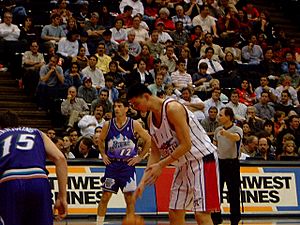
Yao Ming and Tracy McGrady (2002–2009)
In the 2002 NBA draft, the Rockets got the first pick and chose Yao Ming, a 7 feet 6 inches (2.29 m) tall Chinese center. The Rockets improved by 15 wins but missed the 2003 playoffs by one game.
The 2003–04 season was the Rockets' first in their new arena, Toyota Center. They also got new uniforms and a new logo. Rudy Tomjanovich resigned as head coach, and Jeff Van Gundy took over. The Rockets made the playoffs but lost to the Lakers in the first round.
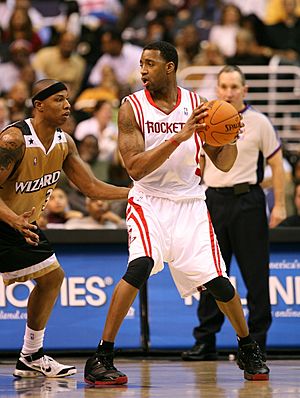
In the off-season, the Rockets made big changes, getting Tracy McGrady in a trade. McGrady and Yao Ming formed a strong duo. They helped the Rockets win 22 games in a row in the 2007–08 season, which was the third longest winning streak in NBA history at the time. However, both players often had injuries and didn't win any playoff series together. Yao Ming was chosen to carry China's flag at the 2008 Summer Olympics opening ceremony. After the 2007 playoffs, Van Gundy was fired, and Rick Adelman became coach.
For the 2008–09 season, the Rockets signed Ron Artest. McGrady played only half the games due to injury, but the Rockets finished with 53 wins. In the playoffs, they beat the Portland Trail Blazers, winning their first playoff series since 1997. However, they lost to the Lakers in the second round, and Yao Ming got another season-ending injury.
Rebuilding and James Harden (2009–2021)
Competitive Rebuilding (2009–2012)
In the 2009–10 season, Artest and McGrady left the team. Despite good play from Kevin Martin and Aaron Brooks, the Rockets missed the playoffs. Yao Ming got another injury in the 2010–11 season and retired. Coach Adelman was fired, and general manager Daryl Morey decided to rebuild the team using advanced statistics. Kevin McHale became the new head coach.
The James Harden Era (2012–2021)
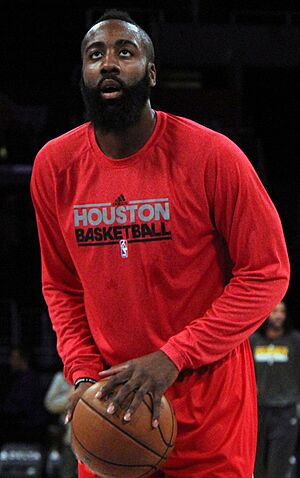
In 2012, the Rockets made a big move by getting James Harden, who was the Sixth Man of the Year. Harden immediately made a huge impact, averaging 25.9 points per game. With Harden and McHale's fast-paced offense, the Rockets became one of the highest-scoring teams in the NBA. In the playoffs, they lost to the Oklahoma City Thunder in the first round.
The Rockets wanted another star player and signed Dwight Howard in 2013. With Harden and Howard, the team was expected to compete for a championship. However, in the playoffs, they lost to the Portland Trail Blazers in the first round. In the 2014–15 season, the Rockets started strong. Harden played exceptionally well, becoming an MVP candidate. He was the first Rocket since Hakeem Olajuwon to score 50 points in a game. The Rockets won their division title for the first time since 1994 and finished with 56 wins. In the playoffs, they beat the Mavericks and then came back from a 3–1 deficit to beat the Los Angeles Clippers. They reached the Western Conference Finals for the first time in 18 years but lost to the Golden State Warriors.
In the 2015–16 season, coach McHale was fired after a bad start. The Rockets struggled but made the playoffs by winning their last game. They lost to the Golden State Warriors again in five games.
Arrival of Mike D'Antoni (2016–2020)
In 2016, Mike D'Antoni became the new head coach. Dwight Howard left, and the Rockets signed Ryan Anderson and Eric Gordon to fit D'Antoni's fast-paced offense. Harden had a great start to the 2016–17 season and was a top MVP candidate. The Rockets finished third in the Western Conference. D'Antoni was named Coach of the Year, and Eric Gordon was Sixth Man of the Year. In the playoffs, the Rockets beat the Oklahoma City Thunder. In the next round, they faced the San Antonio Spurs. The series went to seven games, and the Rockets lost after Nenê got injured.
In 2017, Houston billionaire Tilman Fertitta bought the Rockets. The team also traded for Chris Paul, an 8-time All-NBA player. Even though Paul missed many games with an injury, he was a key addition. The team finished with a franchise-best 65 wins. In the playoffs, Houston beat the Minnesota Timberwolves and Utah Jazz. They faced the Golden State Warriors again in the Conference Finals. The Rockets led 3–2, but Paul got injured. His absence was felt, and the Warriors won the last two games.
The Rockets made some changes to their roster in the 2018 off-season. They started the season slowly, and Carmelo Anthony left the team. James Harden then went on an amazing streak, scoring at least 30 points in 32 straight games. He averaged 41.1 points during that time. The Rockets improved greatly and finished fourth in the Western Conference. They set a new NBA record for most three-pointers made in a game twice. They beat the Utah Jazz in the playoffs but lost to the Golden State Warriors for the fourth time in five years.
In 2019, the Rockets traded Chris Paul for Russell Westbrook, Harden's former teammate. In the middle of the 2019–20 season, the Rockets made a big trade to get Robert Covington and focus on a "small ball" style of play, using smaller players who could shoot from far away. This style was new and exciting. Harden and Westbrook became the first teammates in NBA history to both average over 30 points and 5 assists per game.
After the Rockets lost in the playoffs to the Los Angeles Lakers, D'Antoni and Morey left the team. Rafael Stone became the new general manager, and Stephen Silas was hired as head coach. The team made several trades, including getting Christian Wood and John Wall. In January 2021, Harden was traded to the Brooklyn Nets in a big four-team deal. The Rockets received several draft picks and players like Victor Oladipo. The team finished the season with a 17–55 record, the worst in the league, due to many injuries and trades.
Developing Young Talent (2021–Present)
In the 2021 NBA draft, the Rockets picked Jalen Green second overall. They focused on developing young players like Green, Kevin Porter Jr., Alperen Şengün, and Josh Christopher. John Wall was benched for the entire season. In the 2021–22 season, the Rockets were again at the bottom of the league with a 20–62 record. Jalen Green was named to the NBA All-Rookie First Team.
In the 2022 NBA draft, the Rockets selected Jabari Smith Jr. and Tari Eason. They traded Christian Wood and bought out John Wall's contract to continue building around their young core.
On February 9, 2023, the Rockets traded Eric Gordon. They finished the 2022–23 regular season with a 22–60 record. Head coach Stephen Silas was fired and replaced by Ime Udoka.
In the 2023 off-season, the Rockets signed Fred VanVleet and Dillon Brooks. They also drafted Amen Thompson and Cam Whitmore in the 2023 NBA draft. Şengün had a great season, averaging 21.1 points, 9.3 rebounds, and 5 assists, but he got an ankle injury in March.
The Houston Rockets selected Reed Sheppard with the third pick in the 2024 NBA draft. Building on their momentum, they had a breakout season, finishing 52–30 and securing the second seed in the Western Conference. Şengün made his first All-Star Game appearance, and Amen Thompson had a great year. The Rockets made their first playoff appearance in five years but lost to the Golden State Warriors in a tough seven-game series.
On July 6, 2025, the Rockets traded Jalen Green and Dillon Brooks to the Phoenix Suns for All-Star Kevin Durant.
Season-by-Season Records
Here are the results for the last five seasons. For a complete history, see List of Houston Rockets seasons.
Note: GP = Games played, W = Wins, L = Losses, W–L% = Winning percentage
| Season | GP | W | L | W–L% | Finish | Playoffs |
| 2020–21 | 72 | 17 | 55 | .236 | 5th, Southwest | Did not qualify |
| 2021–22 | 82 | 20 | 62 | .244 | 5th, Southwest | Did not qualify |
| 2022–23 | 82 | 22 | 60 | .268 | 4th, Southwest | Did not qualify |
| 2023–24 | 82 | 41 | 41 | .500 | 3rd, Southwest | Did not qualify |
| 2024–25 | 82 | 52 | 30 | .634 | 1st, Southwest | Lost in first round, 3–4 (Warriors) |
Home Arenas
When the Rockets were in San Diego, they played at the San Diego Sports Arena. After moving to Houston, they played in different places for their first two years, like the Astrodome and Sam Houston Coliseum. They also played "home" games in other cities to try and get more fans. In their first Houston season, they had low attendance, sometimes with fewer than 5,000 fans.
Their first permanent home in Houston was the Hofheinz Pavilion at the University of Houston, which held 10,000 people. They played there for four years. In 1975, they moved to The Summit, which could hold 16,611 fans. This was their home for 28 years and was renamed the Compaq Center in 1998. After winning the 1994 championship, the Rockets sold out 176 home games in a row. However, in the early 2000s, their attendance dropped.
For the 2003–04 season, the Rockets moved into their new arena, Toyota Center, which holds 18,500 people. In the 2007–08 season, when the team had a 22-game winning streak, they had their best attendance numbers. These numbers got even better after James Harden joined the team in 2012. The Rockets sold out almost all their home games in the 2013–14 and 2014–15 seasons.
Team Identity
Uniforms and Logos
When the Rockets started in San Diego, their colors were green and gold. Their first logo showed a rocket with a basketball.
When they moved to Houston in 1971, they changed green to red. Their logo showed a player with a basketball launching upward.
For the 1972–73 season, the Rockets introduced the famous "ketchup and mustard" logo, which had a gold basketball with red trails. This design was used during their championship years in 1994 and 1995.
After the 1995 championship, the Rockets changed their look again. They held a fan contest for a new logo. The winning idea was a rocket orbiting a basketball, which was then designed to look like a cartoon rocket with a shark mouth. Red was still used, but navy blue and silver became the main colors. The uniforms had pinstripes and futuristic numbers. This look was used until the 2002–03 season.
In the 2003–04 season, the Rockets got new, simpler logos and uniforms. The new logo was a stylish 'R' shaped like a rocket taking off, with a red circle around it. Red became the main color again, with silver and black as secondary colors. In 2009, the Rockets brought back a red alternate uniform with gold numbers, like their championship years. They also had special sleeved jerseys, including one that looked like NASA's Gemini-Titan rocket.
When Nike became the NBA's uniform supplier in 2017, the Rockets made small changes to their uniforms. They also wore a "City" uniform with Chinese lettering. In 2019, the Rockets showed a new secondary logo with a basketball as a planet. They also unveiled new uniforms with updated letters and bold side panels. They brought back their classic "ketchup and mustard" red uniform as a throwback. Their 2019–20 "City" uniform had a space theme inspired by NASA.
The Rockets' 2020–21 "City" uniform was light blue, honoring the city of Houston and its former NFL team, the Houston Oilers. For the 2021–22 season, Credit Karma became a sponsor on the team's jerseys.
The 2021–22 "City" uniform combined different past designs. It had navy blue and white pinstripes from the 1995–2003 uniforms, a modified "ketchup and mustard" logo, and the modern 'R' logo.
For the 2023–24 "City" uniform, the Rockets were inspired by the Phi Slama Jama-era Houston Cougars from the 1980s. The white uniform had "H-Town" in red cursive letters. They also had a special court for the 2023 NBA in-season tournament.
The "H-Town" theme returned for the 2024–25 "City" uniform, celebrating the 30th anniversary of the Rockets' 1994 and 1995 championships. It featured "H-Town" in a style similar to their 1972–1995 logo. The uniform also had the logo of their old arena, The Summit, and signatures of Hakeem Olajuwon and Clyde Drexler.
Mascots
The Rockets introduced their mascot, Clutch the Bear, on March 14, 1995. Before that, from 1993 to 1995, their mascot was Turbo, who did acrobatic dunks. In 1995, Clutch, a large teddy bear-like mascot, joined the team. After eight years, Turbo retired, and Clutch became the only mascot. Clutch is one of the most recognizable mascots in the league and was inducted into the Mascot Hall of Fame in 2006.
Rivalries
The Rockets have several rivalries in the Western Conference. Two are with other Texas teams: the San Antonio Spurs and the Dallas Mavericks. Houston has played both teams in the playoffs. Other famous rivalries include the Los Angeles Lakers in the 1980s and the Utah Jazz. The Rockets beat the Jazz in both championship seasons but lost to them five other times.
Honors and Statistics
Individual Honors
NBA Scoring Champions
NBA Defensive Player of the Year
NBA Rookie of the Year
NBA Sixth Man of the Year
NBA Most Improved Player
NBA Coach of the Year
NBA Executive of the Year
J. Walter Kennedy Citizenship Award
NBA Hustle Award
|
NBA All-Defensive First Team
NBA All-Defensive Second Team
NBA All-Rookie First Team
NBA All-Rookie Second Team
|
All-NBA First Team
All-NBA Second Team
All-NBA Third Team
|
All-Star Weekend
|
All-Star Game MVP
Three-Point Contest Champion
Skills Challenge Champion
|
Team Leaders (Regular Season)
Bold means the player is still active with the team. Italics means the player is still active but not with the team.
Points Scored (as of the end of the 2024–25 season)
- Hakeem Olajuwon (26,511)
- James Harden (18,365)
- Calvin Murphy (17,949)
- Rudy Tomjanovich (13,383)
- Elvin Hayes (11,762)
- Moses Malone (11,119)
- Yao Ming (9,247)
- Robert Reid (8,823)
- Mike Newlin (8,480)
- Otis Thorpe (8,177)
- Cuttino Mobley (7,448)
- Steve Francis (7,281)
- Tracy McGrady (6,888)
- Allen Leavell (6,684)
- Jalen Green (6,173)
- Vernon Maxwell (6,002)
- Ralph Sampson (5,995)
- Eric Gordon (5,944)
- Kenny Smith (5,910)
- Luis Scola (5,597)
- Rodney McCray (5,059)
- Sleepy Floyd (5,030)
- Stu Lantz (4,947)
- Trevor Ariza (4,863)
- Alperen Şengün (4,583)
- Lewis Lloyd (4,384)
- Clyde Drexler (4,155)
- Buck Johnson (4,139)
- John Block (4,138)
- Clint Capela (4,075)
- Don Kojis (4,037)
- John Lucas II (3,756)
- Kevin Kunnert (3,550)
- Aaron Brooks (3,465)
- Rafer Alston (3,370)
- Mario Elie (3,356)
- Robert Horry (3,109)
- Kevin Martin (3,068)
- Shane Battier (3,052)
- Charles Barkley (3,017)
- Chandler Parsons (3,002)
- Matt Bullard (2,991)
- Dwight Howard (2,919)
- Ed Ratleff (2,813)
- Jim Barnett (2,794)
- Jabari Smith Jr. (2,752)
- Patrick Beverley (2,708)
- Mitchell Wiggins (2,648)
- Maurice Taylor (2,619)
- Cliff Meely (2,594)
Other Statistics (as of the end of the 2024–25 season)
| Most Minutes Played | |
|---|---|
| Player | Minutes |
| Hakeem Olajuwon | 42,844 |
| Calvin Murphy | 30,607 |
| Rudy Tomjanovich | 25,714 |
| James Harden | 23,006 |
| Robert Reid | 21,718 |
| Elvin Hayes | 20,782 |
| Otis Thorpe | 18,631 |
| Moses Malone | 17,780 |
| Mike Newlin | 17,646 |
| Cuttino Mobley | 16,343 |
| Most Rebounds | |
|---|---|
| Player | Rebounds |
| Hakeem Olajuwon | 13,382 |
| Elvin Hayes | 6,974 |
| Moses Malone | 6,959 |
| Rudy Tomjanovich | 6,198 |
| Otis Thorpe | 5,010 |
| Yao Ming | 4,494 |
| James Harden | 3,736 |
| Robert Reid | 3,706 |
| Clint Capela | 3,243 |
| Ralph Sampson | 3,189 |
| Most Assists | |
|---|---|
| Player | Assists |
| James Harden | 4,796 |
| Calvin Murphy | 4,402 |
| Allen Leavell | 3,339 |
| Hakeem Olajuwon | 2,992 |
| Mike Newlin | 2,581 |
| Kenny Smith | 2,457 |
| Steve Francis | 2,411 |
| Sleepy Floyd | 2,363 |
| John Lucas II | 2,358 |
| Robert Reid | 2,253 |
| Most Steals | |
|---|---|
| Player | Steals |
| Hakeem Olajuwon | 2,088 |
| Calvin Murphy | 1,165 |
| James Harden | 1,087 |
| Allen Leavell | 929 |
| Robert Reid | 881 |
| Trevor Ariza | 683 |
| Steve Francis | 619 |
| Vernon Maxwell | 559 |
| Cuttino Mobley | 526 |
| Sleepy Floyd | 470 |
| Most Blocks | |
|---|---|
| Player | Blocks |
| Hakeem Olajuwon | 3,740 |
| Yao Ming | 920 |
| Moses Malone | 758 |
| Ralph Sampson | 585 |
| Clint Capela | 491 |
| Kelvin Cato | 431 |
| Kevin Kunnert | 413 |
| James Harden | 390 |
| Robert Reid | 364 |
| Shane Battier | 351 |
| Most Three-Pointers Made | |
|---|---|
| Player | 3-pointers made |
| James Harden | 2,029 |
| Eric Gordon | 1,054 |
| Trevor Ariza | 876 |
| Jalen Green | 779 |
| Vernon Maxwell | 730 |
| Cuttino Mobley | 672 |
| Shane Battier | 576 |
| Matt Bullard | 557 |
| Kenny Smith | 521 |
| Rafer Alston | 517 |
Team Personnel
Current Roster
Draft Rights Retained
The Rockets currently hold the draft rights to players who were drafted but have not yet signed with an NBA team and are playing elsewhere. The team keeps these rights until one year after the player's contract with the non-NBA team ends.
| Draft | Round | Pick | Player | Pos. | Nationality | Current team | Note(s) | Ref |
|---|---|---|---|---|---|---|---|---|
| 2017 | 2 | 60 | Alpha Kaba | F/C | Goyang Sono Skygunners (South Korea) | Acquired from the Atlanta Hawks |
Retired Numbers
The Rockets have honored several players by retiring their jersey numbers, meaning no other player on the team can wear that number.
| Houston Rockets Retired Numbers | ||||
|---|---|---|---|---|
| No. | Player | Position | Tenure | Ceremony Date |
| 11 | Yao Ming | C | 2002–2011 | February 3, 2017 |
| 22 | Clyde Drexler | G | 1995–1998 | February 3, 2000 |
| 23 | Calvin Murphy | G | 1970–1983 | March 17, 1984 |
| 24 | Moses Malone | C | 1976–1982 | April 19, 1998 |
| 34 | Hakeem Olajuwon | C | 1984–2001 | November 9, 2002 |
| 44 | Elvin Hayes | F/C | 1968–1972 1981–1984 |
November 18, 2022 |
| 45 | Rudy Tomjanovich | F1 | 1970–1981 | January 28, 1982 |
| CD | Carroll Dawson | Assistant coach General manager2 |
1980–2007 | April 16, 2007 |
- 1 Also served as head coach (1991–2003).
- 2 As Dawson did not play for the Rockets, the team used his initials.
- The NBA retired Bill Russell's No. 6 for all its teams on August 11, 2022.
Basketball Hall of Famers
Several players and coaches who were part of the Houston Rockets have been inducted into the Naismith Memorial Basketball Hall of Fame.
| Houston Rockets Hall of Famers | ||||
|---|---|---|---|---|
| Players | ||||
| No. | Name | Position | Tenure | Inducted |
| 2 4 |
Rick Barry | F | 1978–1980 | 1987 |
| 11 44 |
Elvin Hayes | C/F | 1968–1972 1981–1984 |
1990 |
| 23 | Calvin Murphy | G | 1970–1983 | 1993 |
| 21 24 |
Moses Malone | C/F | 1976–1982 | 2001 |
| 22 | Clyde Drexler 1 | G/F | 1995–1998 | 2004 |
| 4 | Charles Barkley 1 | F | 1996–2000 | 2006 |
| 34 | Hakeem Olajuwon | C | 1984–2001 | 2008 |
| 33 | Scottie Pippen 1 | F | 1999 | 2010 |
| 50 | Ralph Sampson | C/F | 1983–1987 | 2012 |
| 55 | Dikembe Mutombo | C | 2004–2009 | 2015 |
| 11 | Yao Ming | C | 2002–2011 | 2016 |
| 1 3 |
Tracy McGrady | G/F | 2004–2010 | 2017 |
| Coaches | ||||
| Name | Position | Tenure | Inducted | |
| Alex Hannum | Head coach | 1969–1971 | 1998 | |
| Tex Winter | Head coach | 1971–1973 | 2011 | |
| Bill Fitch | Head coach | 1983–1988 | 2019 | |
| 45 | Rudy Tomjanovich 2 | Head coach | 1992–2003 | 2020 |
| 12 | Rick Adelman 4 | Head coach | 2007–2011 | 2021 |
| Contributors | ||||
| Pete Newell 3 | General manager | 1968–1971 | 1979 | |
| Del Harris | Assistant coach Head coach |
1976–1979 1979–1983 |
2022 | |
Notes:
- 1 These three players were also inducted for being part of the 1992 Olympic team.
- 2 Tomjanovich also played for the Rockets from 1970 to 1981 and was an assistant coach from 1983 to 1992.
- 3 Newell was inducted twice: as a contributor and as a member of the 1960 Olympic team.
- 4 Adelman also played for the Rockets from 1968 to 1970.
FIBA Hall of Famers
The FIBA Hall of Fame recognizes great international basketball players.
| Houston Rockets Hall of Famers | ||||
|---|---|---|---|---|
| Players | ||||
| No. | Name | Position | Tenure | Inducted |
| 34 | Hakeem Olajuwon | C | 1984–2001 | 2016 |
| 11 | Yao Ming | C | 2002–2011 | 2023 |
Team Management
General Managers
| GM History | |
|---|---|
| GM | Tenure |
| Jack McMahon | Mar 1967 – June 1968 |
| Pete Newell | June 1968 – May 1972 |
| Ray Patterson | May 1972 – September 1989 |
| Steve Patterson | September 1989 – August 1993 |
| Tod Leiweke | August 1993–January 1994 |
| Bob Weinhauer | January 1994 – May 1996 |
| Carroll Dawson | May 1996 – May 2007 |
| Daryl Morey | May 2007–October 2020 |
| Rafael Stone | October 2020–present |
Owners
| Ownership History | |
|---|---|
| Owner | Tenure |
| Robert Breitbard | January 1967 – June 1971 |
| Billy Goldberg, Wayne Duddlesten, Mickey Herskowitz | June 1971 – December 1973 |
| Irvin Kaplan | December 1973 – September 1975 |
| Wayne Duddlesten and Ray Patterson | September 1975 – February 1977 |
| Kenneth Schnitzer | February 1977 – May 1979 |
| George J. Maloof, Sr. | May 1979 – November 1980 |
| Gavin Maloof | November 1980 – June 1982 |
| Charlie Thomas | June 1982 – July 1993 |
| Leslie Alexander | July 1993 – October 2017 |
| Tilman Fertitta | October 2017 – present |
Head Coaches
- San Diego Rockets
| Coach | Tenure |
|---|---|
| Jack McMahon | 1968–1970 |
| Alex Hannum | 1970–1971 |
- Houston Rockets
| Coach | Tenure |
|---|---|
| Tex Winter | 1971–1973 |
| Johnny Egan | 1973–1976 |
| Tom Nissalke | 1976–1979 |
| Del Harris | 1979–1983 |
| Bill Fitch | 1983–1988 |
| Don Chaney | 1988–1992 |
| Rudy Tomjanovich | 1992–2003 |
| Jeff Van Gundy | 2003–2007 |
| Rick Adelman | 2007–2011 |
| Kevin McHale | 2011–2015 |
| J. B. Bickerstaff (interim) | 2015–2016 |
| Mike D'Antoni | 2016–2020 |
| Stephen Silas | 2020–2023 |
| Ime Udoka | 2023–present |
Team and Politics
On October 4, 2019, the Rockets' general manager Daryl Morey posted a tweet that supported protests in Hong Kong. This caused some disagreement, with the Rockets' owner Tilman Fertitta saying that the team was not a political organization. Morey later deleted the tweet. This tweet led to the Chinese Basketball Association stopping its relationship with the Rockets. Chinese officials also expressed their unhappiness. Both Morey and the NBA later released statements about the tweet, with Morey saying he didn't mean to cause any offense. These statements were then discussed by politicians in the US. Chinese media felt the statements were not apologetic enough.
See also
 In Spanish: Houston Rockets para niños
In Spanish: Houston Rockets para niños


